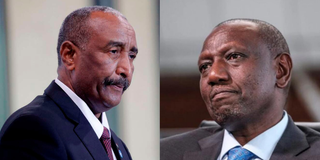Premium
Sudan to Ruto: We still won’t trade with you

Abdel Fattah al-Burhan, Sudan's military leader and President William Ruto(Kenya).
The government of Sudan has rejected claims by President William Ruto that Khartoum was still buying Kenyan tea despite a ban on trade with Nairobi.
President Ruto had on Monday claimed that Kenyan tea is still on sale in Sudan despite a trade ban and urged farmers not to worry about losing the key market.
"We are still selling tea to Sudan even after they said they are not buying our tea. The market itself has forced them. So, there is no issue about the selling of tea, and that is why we are making money in the tea sector," the President said during a media interview at Sagana State Lodge.
But in rejoinder, Sudan through its Embassy in Nairobi maintained that it has not reversed its decision on the ban on all Kenyan imports.
In a statement, Sudan clarified its trade policy concerning imports from Kenya, reiterating that the March 11, 2025, ban has not been revoked.
"Sudan's Ministry of Trade and Supply issued a decree suspending all imports from Kenya in line with Sudan's national interests. This decision has been fully implemented, and since then, no Kenyan products, including Kenyan tea, have been imported into Sudan. Sudan remains firmly committed to upholding this trade policy as part of its sovereign economic and diplomatic considerations," read the statement.
The embassy emphasised that any claims suggesting otherwise are unfounded and inaccurate but reaffirmed Sudan's commitment to regional cooperation and constructive dialogue, guided by the principles of mutual respect and non-interference.
As this happens, more than 207 containers stuffed with tea destined for Sudan are stuck along the supply chain, leading to losses worth more than Sh1.3 billion.
Tea traders said the containers with 400 bags destined for Sudan were lying at the port of Mombasa, while other teas were in warehouses, on the high seas, and at the port in Sudan awaiting clearance.
The East African Tea Trade Association (EATTA), Managing Director George Omuga, has appealed to the government to urgently engage Sudan to allow buyers a window of at least one month to clear the teas already dispatched to that country to mitigate the impending losses to Kenyan traders and farmers.
Early this month, EATTA, an association responsible for trading tea at the Mombasa auction, voiced concern about potential blowback from Sudan, a key market for the country’s biggest commodity, after the Rapid Support Forces (RSF) paramilitary held a symbolic political meeting in Nairobi this week.
The Sudanese government described Kenya’s hosting of RSF, the group which its forces have been fighting in a civil war since March 2023, as an act of hostility against the Sudanese people, leading to the ban of all Kenyan exports to her country last week.
Sudan is ranked among the top 10 markets for Kenyan tea and the standoff could mean a decline in exports to Sudan, impacting trade.
Kenya exports various commodities to Sudan, including tea, food items, and pharmaceutical products.
Before the current hostilities, Sudan bought about Sh18 billion ($37 million) in Kenyan tea.
On March 14, Sudan suspended all imports from Kenya in protest after the paramilitary RSF, which was fighting the army in a two-year civil war, formed a parallel government in Nairobi.
Sudan has been engulfed in a civil war since April 2023, primarily between the Sudanese Armed Forces (SAF) and the paramilitary RSF.
In February, the RSF and its allied political and armed groups signed a founding charter in Kenya, expressing the intention to form a parallel government in Sudan.
Sudan's military government said the import ban was to preserve the country's sovereignty and "protect its national security.





